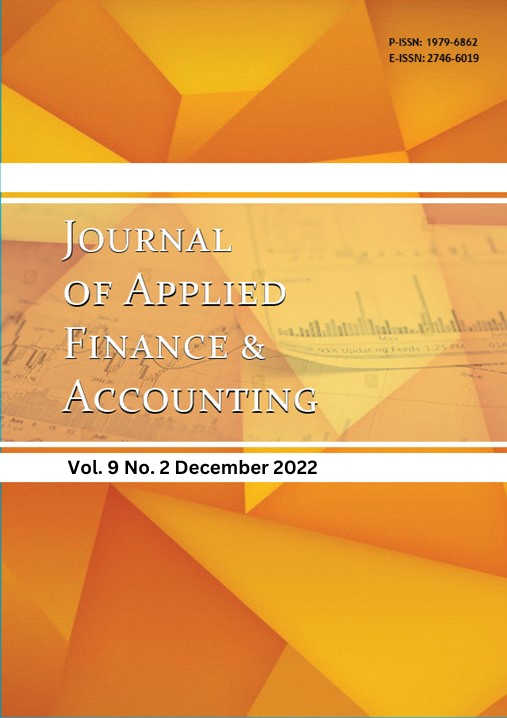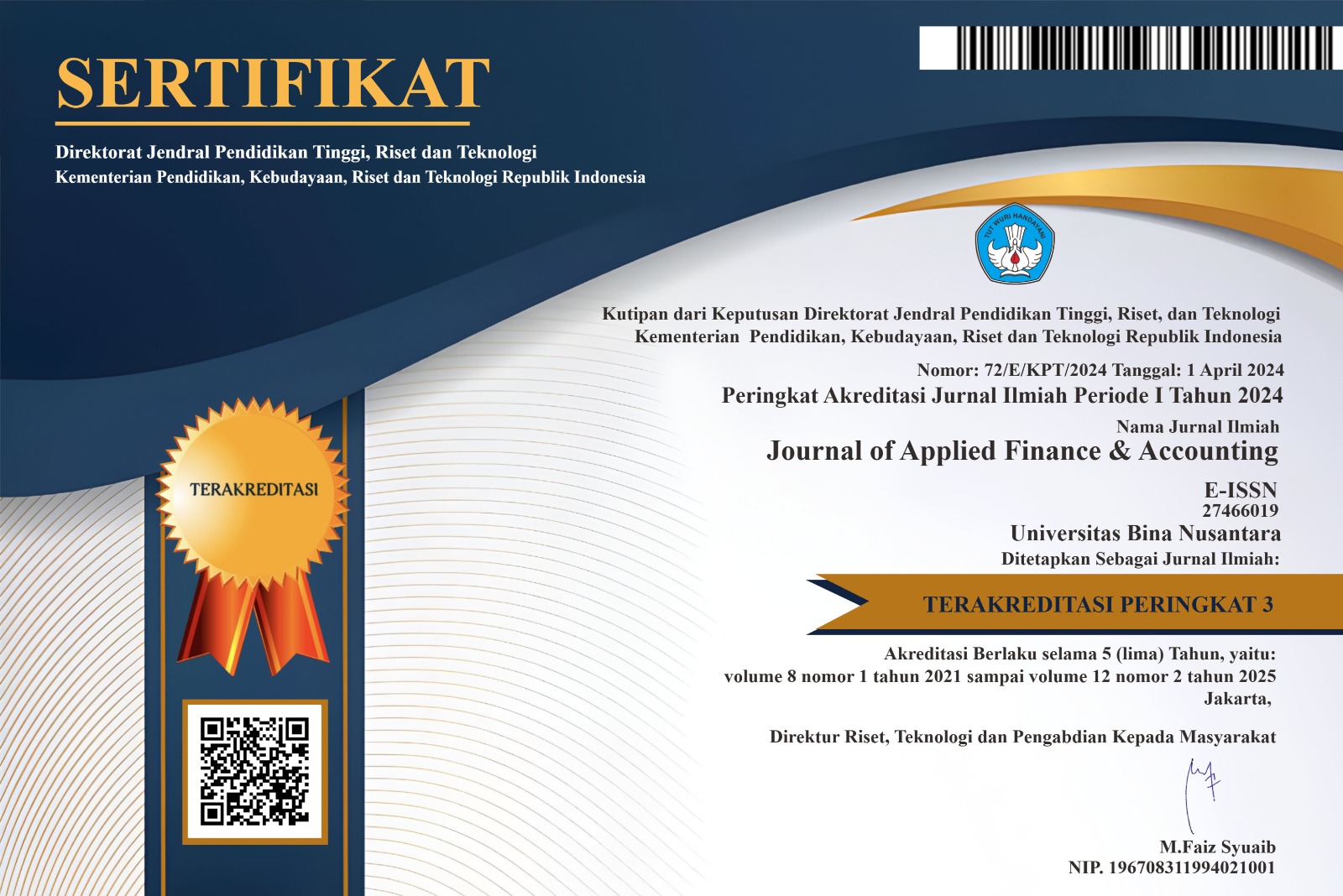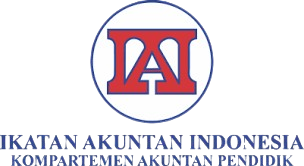THE EFFECT OF AUDITOR COMPETENCE, PROFESSIONAL SKEPTICISM, RED FLAG, AND INTERNAL CONTROL SYSTEM ON FRAUD DETECTION
DOI:
https://doi.org/10.21512/jafa.v9i2.8972Keywords:
Auditor Competence, Professional Skepticism, Red Flag, Internal Control System, Fraud DetectionAbstract
Today more and more cases of fraud occur. In each of these cases, there is always an auditor's failure to detect fraud. It makes the fraud going on for a long time before being discovered. Based on this, we intend to research the factors influencing fraud detection. This study aims to determine the effect of auditor competence, professional skepticism, red flags, and internal control systems on fraud detection. The data collection technique in this study used primary data by distributing questionnaires to auditors working at the Public Accounting Firm (KAP) in the DKI Jakarta area using a purposive sampling method. The data analysis method uses a partial least square model using the SmartPLS 3.3 software. The results of this study indicate that auditor competence, red flag, and internal control system variables significantly affect fraud detection. In contrast, the professional skepticism variable has no significant effect on fraud detection.
References
Abdulahi, R., & Mansor, N. (2015). Forensic and Accounting and Fraud Risk Factors: The Influence of Fraud Diamond Theory. The American Journal of Innovative Research and Applied Sciences, 1(5): 182-192.
Abiola, I., & Oyewole, A., T. (2013). Internal Control System on Fraud Detection: Nigeria Experience. Journal Accounting and Finance, Vol. 13, No. 5.
ACFE Indonesia Chapter. (2020). Survey Fraud Indonesia 2019. Jakarta: ACFE Indonesia Chapter.
ACFE Global. (2020). Report to the Nations: 2020 Global Study on Occupation Fraud and Abuse. West Ave, Austin: ACFE Global Headquarters.
Adedokun, I., A., & Oyewole, T. (2013). Evaluation of the Effect of Monitoring and Control Activities on Fraud Detection in Selected Nigerian Commercial Banks. Research Journal of Finance and Accounting, Vol. 4, No. 6.
Agusti, R., Nastia, D., & Pertiwi, P. (2013). The Influence of Competence, Independence, and Professionalism on Audit Quality (Empirical Study at Public Accounting Firms throughout Sumatra). Journal of Economics, Vol. 21, No. 1-13.
Agustia, D. (2013). The Effect of Free Cash Flow and Audit Quality on Earnings Management. Journal of Accrual Accounting, Vol. 4, No. 2.
Albrecht, C., C., Dean, D., L., & Hansen, J., V. (2005). Marketplace and Technology Standards for B2B e-Commerce: Progress, Challenges, and The State of The Art. ELSEVIER, Vol 42.
American Institute of Certified Public Accountants (AICPA). (2002). Consideration of Fraud in a Financial Statement Audit. Statement on Auditing Standards, No. 99.
Anggriawan, E., F. (2014). The Influence of Work Experience, Professional Skepticism, and Time Pressure on the Auditor's Ability to Detect Fraud (Empirical Study of Public Accounting Firms in DIY). Nominal Journal, Vol.3, No. 2.
Anjilni, R., Q. (2021). Effect of ACHANGE, OSHIP, Leverage, and Receivable on Fraud. Journal of Indonesian Sustainable Accounting, Vol.4, No. 1.
Aprilia, A. (2017). Analysis of the Effect of Pentagon Fraud on Financial Statement Fraud Using the Beneish Model in Companies Implementing the Asean Corporate Governance Scorecard. Journal of Research Accounting ( ASET ), Vol. 9, No. 1.
Arens, A., A., Ellder, J., R., & Beasley, M. (2008). Integrated Approach Auditing and Assurance Services. Erlangga.
Aviantara, R. (2021). The Association between Fraud Hexagon and Government's Fraudulent Financial Report. Asia Pacific Fraud Journal (ACFE) , Vol. 6, No. 1.
Dandi, V. (2017). The Influence of Workload, Training, and Time Pressure on Auditor's Ability to Detect Fraud (Empirical Study of BPK RI Representative of Riau Province). JOM Fekon, Vol. 4, No. 1.
Darwati, Y. (2015). Student tardiness in studies is viewed from Weiner's Attribution Theory (Efforts to Find Solutions for Student Tardiness in Studies in Islamic Psychology Study Program STAIN Kediri). Universe, Vol. 9, No. 1.
Dasila, R., A., & Hajering, H. (2019). The Influence of Experience, Independence, and Professional Skepticism of Auditors on Fraud Detection. Journal of Paradox Economics, Vol. 2, No. 1.
Dewi, K., Y., K., & Ratnadi, N., M., D. (2017). The Influence of Internal Control and Integrity on the Tendency of Accounting Fraud in Denpasar City Regional Work Unit. e-Journal of Accounting at Udayana University, Vol. 18, no. 2.
Ernest, E., & Young, Y. (2005). Unmanaged Risk. 8th Global Survey. Global Investigations Dispute Advisory Services, South Africa.
Hamilton, D., I., & Gabriel, J., M., O. (2012). Dimensions of Fraud in Nigeria Quoted Firms. American Journal of Social and Management Sciences, Vol. 3, No. 3.
Hartan, T., H., & Waluyo, I. (2016). The Influence of Professional Skepticism, Independence, and Competence on Auditor's Ability to Detect Fraud (Empirical Study at the Inspectorate of the Special Region of Yogyakarta). Profita Journal: Accounting Studies, Vol. 4, No. 3.
Heider, F. (1958). The Psychology of Interpersonal Relations. New York: Wiley.
Helmiati, H. (2021). The Influence of Application of the Code of Ethics, Experience, and Professional Skepticism of the Auditor on Fraud Detection. My Encyclopedia Journal, Vol. 3, No. 3.
Hermiyetti, H. (2010). Effect of Internal Control Implementation on Goods Procurement Fraud Prevention. Jakarta: STEKPI.
Horne, J., Venter, J., & Lochner, H. (2018). The Red Flag System as the Gatekeeper in Tender Fraud Prevention and Detection of Mispresentation. International Journal of African Renaissance Studies. Vol. 13, No. 1.
Hugo, J. (2019). The Effectiveness of the Beneish M-Score Model and the Model in Detecting Fraudulent Financial Statements. Muara Journal of Economics and Business, Vol. 3, No. 1.
Izevbigie, D., P., I. (2020). Rationalization of Red Flags and Likelihood of Fraud Detection in Nigeria. EPRA International Journal of Multidisciplinary Research (IJMR), Vol. 6, No. 11.
Kranachar, M. (2013). The Role of Research in the Prevention of Fraud. CPA Journal, Vol. 9, No. 80.
Kulikova, L., I., & Satdarova, D., R. (2016). Internal Control and Compliance Control as Effective Methods of Management, Detection, and Prevention of Financial Statement Fraud. Academy of Strategic Management Journal, Vol. 15.
Kurniawati, E. (2012). Analysis of Factors Influencing Fraud Financial Statements in a Fraud Triangle Perspective. Diponegoro Journal of Accounting.
Laksana, A., C., & Achmad, T. (2020). The Influence of the Quality of Fraud Brainstorming Sessions on the Auditor's Ability to Detect Fraud in Financial Statements (Empirical Study of KAP in Semarang). Diponegoro Journal of Accounting, Vol. 9, No. 4.
Mangala, D., & Kumari, P. (2017). Auditors Perceptions of the effectiveness of Fraud Prevention and Detection Methods. Indian Journal of Corporate Governance, Vol. 10, No. 2.
Marks, J. (2012). The Mind Behind Fraudsters Crime: Key Behavioral and Environmental Elements.
Mokoagouw, M., Kalangi, L., & Gerungai, N. (2018). The Influence of Professional Skepticism and Auditor Experience on the Ability of External Auditors in Detecting Fraud (Survey of BPK RI Auditors North Sulawesi Representative). Journal of Going Concern Accounting Research, Vol. 13, No. 2.
Morrisan, M. (2013). Communication Theory: Individual to Mass. Jakarta: Kencana.
Mulyadi, M. (2013). Accounting System 3rd edition. Jakarta: Salemba.
Noviyanti, S. (2008). Auditor's Professional Skepticism in Detecting Fraud. Indonesian Journal of Accounting and Finance, Vol. 5, No. 1.
Patricia, et al. (2015). Evaluation of the Accounting Information System for Inpatient Cash Receipts and Disbursements at RSIP Prof. Dr. R.D. Kandou Manado. Emba Journal, Vol. 2, No. 4.
Rahadi, F., P. (2021). The Effect of Online Business Internal Control on Fraud Prevention. Journal of Accounting UMMI (JAMMI), Vol. 1, No. 2.
Ridwan, M., Suraida, I., Septiawan, B., and Dewi, E., A. (2021). Auditor Skepticism and Fraud Triangle Dimensions in Detecting Fraud. Journal of Accounting and Finance Studies, AKURASI Journal of Accounting and Finance Studies, Vol. 4, No. 1.
Sanjaya, A. (2017). The Influence of Professional Skepticism, Independence, Competence, Auditor Training, and Audit Risk on the Auditor's Responsibility in Detecting Fraud. Journal of Business Accounting, Vol. 15, No. 1.
Sari, N., P., I., E., & Adnantara, K., F. (2019). The Influence of Independence, Competence, Red Flags, and Auditor's
Responsibility on Auditor's Ability to Detect Fraud. Journal Research Accounting (JARAC), Vol. 1, No. 1.
Sasmita, D., A., Nasrizal, N., & Rasuli, M. (2021). The Influence of Human Resource Competence, Application of the Regional Financial Accounting System, and the Role of Internal Auditors on the Quality of Regional Financial Reports (Empirical Study on OPD of Rokan Hilir Regency). Journal of Accounting and Auditing Studies (JKAA), Vol. 15, No. 2.
Silverstone, H., & Sheetz, N. (2007). Forensic Accounting and Fraud Investigation for Non-Expertsm 2nd edition. New Jersey: John-Wiley & Sons Inc.
Singleton, T., W, & Singleton, A., J. (2010). Fraud Auditing and Forensic Accounting. New Jersey: John-Wiley & Sons Inc.
Skousen, C., J., & Twedt, B., J. (2019). Fraud in Emerging Markets: A Cross Country Analysis. Cross Cultural Management: An International Journal, Vol. 16.
State Financial Audit Standards (SPKN). (2017). Examination Conceptual Framework. Expertise Management and Examiner, No. 50.
Sugiyono, S. (2016). Combination Research Methods. Bandung: Alphabet.
Sulistiyanti, R. (2020). The Influence of Independence, Professional Skepticism, and Tenure Audits on the Ability of the Government's Internal Supervisory Apparatus to Detect Fraud. Bongaya Journal for Research (BJRA), Vol. 3, No. 2.
Suryanto, R., Indriyani, S., & Solayani, H. (2017). Determinants of Auditor's Ability to Detect Fraud. Journal of Accounting and Investment, Vol. 18, no. 1.
Sutrisno, D., F. (2014). The Influence of Experience, Expertise, Audit Situation, Ethics, and Gender on the Accuracy of Giving Auditor's Opinion Through Auditor's Professional Skepticism (Case Study of KAP in Bekasi). Journal of Accounting Research and Accounting Computerization, Vol. 5, No. 2.
Tedjasukma, F., N. (2012). The Importance of Red Flags for Independent Auditors to Detect Fraud in Financial Statements. Accounting Student Scientific Periodical, Vol. 1, No. 3.
Tessa, C. G. & Harto, P. (2016). Fraudulent Financial Reporting: Testing the Pentagon's Fraud Theory on the Financial and Banking Sector in Indonesia. Lampung: National Symposium on Accounting XIX.
Tuanakotta, T. (2012). Forensic Accounting and Investigative Auditing. Jakarta: Publishing Institute, Faculty of Economics, University of Indonesia.
Vanhoof, K., & Lybaert, N. (2015). Data Mining for Fraud Detection: Towards an Improvement on Internal Control System. ACADEMIA.
Vousinas, G., L. (2019). Advancing Theory of Fraud: The S.C.O.R.E Model. Emerald Insight: Journal of Financial Crime, Vol. 8, No. 13.
Wajaya, F. & Ropianto, M. (2020). Web-Based Excel Data Automation Record Design at PT Varta Microbattery Indonesia. ACADEMIA.
Waworuntu, B. (2010). Leadership Determinants. Makara, Social Humanities, Vol. 7, No. 2.
Wibowo, P., F., A., & Noegroho, Y., A., K. (2020). Effect of Understanding of the Government Auditor's Code of Ethics on the Auditor's Ability to Detect Fraud. Journal of Business and Economics, Vol. 27, no. 1.
Yanti, H., B. (2013). Auditor's Understanding of Fraud Schemes, Red Flags, Detection Mechanisms, and Fraud Prevention Mechanisms. Accounting, Auditing & Information Research Media, Vol. 13, No. 3.
https://www.kemenkeu.go.id/publikasi/berita/ini-decision-case- reports-keuangan-tahunan-pt-garuda-indonesia-2018/ accessed 22 September 2021
https://adoc.pub/standar-umum-register-i-si-201-data-standard-general-date-berl.html/ PSA 210.1 SPAP
Downloads
Published
Issue
Section
License
Authors who publish with this journal agree to the following terms:
Authors retain copyright and grant the journal right of first publication with the work simultaneously licensed under a Creative Commons Attribution License that allows others to share the work with an acknowledgement of the work's authorship and initial publication in this journal.
Authors are able to enter into separate, additional contractual arrangements for the non-exclusive distribution of the journal's published version of the work (e.g., post it to an institutional repository or publish it in a book), with an acknowledgement of its initial publication in this journal.
Authors are permitted and encouraged to post their work online (e.g., in institutional repositories or on their website) prior to and during the submission process, as it can lead to productive exchanges, as well as earlier and greater citation of published work (See The Effect of Open Access).





